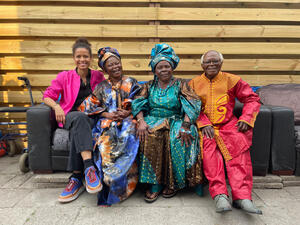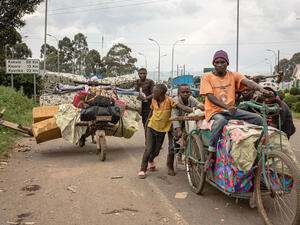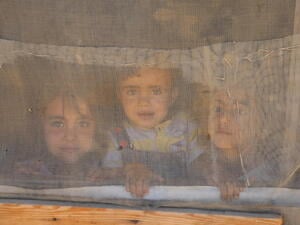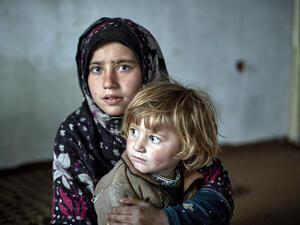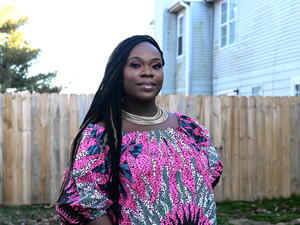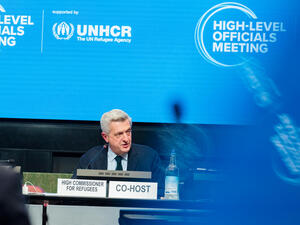After fleeing violence in Darfur, resettled refugee cherishes new life in Alaska
After fleeing violence in Darfur, resettled refugee cherishes new life in Alaska

At-Tahir Karief, the first refugee from Darfur to be resettled in Alaska, has found safety and freedom in the United States.
ANCHORAGE, Alaska, December 15 (UNHCR) - The first refugee from Darfur to find a home in Anchorage, Alaska, thrives in the cold northern climate, having found a safe haven and freedom far from his native country.
At-Tahir Karief, a farmer from Darfur, arrived in Alaska in February 2008 and now works for a cargo company loading and unloading airplanes at the Anchorage airport. A native Arabic speaker, he began learning English in refugee camps, but takes regular classes to improve his language skills. He and his wife both work, but find daycare for their children to be a challenge, as well as saving money for the future. Still, the family is extremely grateful to have found a new home.
"I love it so much here. I can feel peace. I love freedom. Nobody bothers me. We are very satisfied and happy with what we have," says Karief. Nevertheless, he remains disturbed by the tragic events in his home country and remains hopeful for a peaceful solution to the crisis in Darfur.
Now firmly rooted in Anchorage, Karief mentors newly-arrived refugees by greeting them at the airport and helping them adjust to a new culture. Over the past 18 months, nearly 70 refugees from Darfur have arrived in Alaska.
"The weather is not the biggest challenge refugees face, but it does feed into some of their problems," says Dr. Karen Ferguson of Catholic Social Services in Anchorage. "We have a very low out migration rate. People don't leave us. At the same time, refugees do struggle with earning enough money to pay for bills, finding transportation in a city with an unfriendly bus system and becoming independent."
Anchorage, a city of 300,000, has less diversity than other U.S. cities. Housing is can be expensive and the employment rate is moderate. "People in Alaska are very friendly and refugees seem to get beyond their problems," says Ferguson. In addition to refugees from Darfur, Catholic Social Services has also helped refugees from Bhutan, Democratic Republic of Congo, Somalia, the former Soviet Union, Iran and Iraq start new lives in Alaska.
Running a smaller program compared with many other states, Catholic Social Services is the only resettlement agency in Alaska, providing assistance to more than 300 newly enrolled refugees a year. The agency provides rent, food, clothes and cash assistance and helps refugees find housing and employment upon arrival. Ultimately, the agency works to help refugees live independently.
Having fled the conflict in Sudan in 2004, Karief began his journey in a refugee camp in Chad.
After leaving Chad he and his family traveled by bus across Africa through Cameroon, Nigeria and Benin, and then lived in a refugee camp in Ghana for three years. In Ghana he felt safe, but living conditions in the camp quickly deteriorated. After several months, he found there was little food, water and medication for his family. UNHCR referred Karief to the U.S. resettlement program. After waiting for several months, Karief was told he would be resettled to the U.S. with his family.
"The Sudanese value education. They hope that by being resettled to the United States they and their children will get an education. But the truth is when you come to the U.S. through the resettlement program, the plan is work first, not education. The refugees want to take college classes and learn English, yet they have to start by taking entry level jobs," Ferguson says.
Holding on to the hope that his children will be well-educated, Karief expects that his children will learn to read, go to college and find jobs helping fellow refugees. "I wanted a better life for my kids and now I've found it in Alaska."
By Lilli Tnaib in Washington, DC


